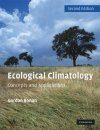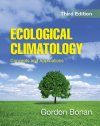![Ecological Climatology Ecological Climatology]()
Click to have a closer look
About this book
Contents
Biography
Related titles
Recommended titles
About this book
Ecological Climatology introduces an interdisciplinary framework to understand the interaction between terrestrial ecosystems and climate change. It reviews basic meteorological, hydrological and ecological concepts to examine the physical, chemical and biological processes by which terrestrial ecosystems affect and are affected by climate. Ecological Climatology is written for advanced undergraduate and graduate students studying ecology, environmental science, atmospheric science and geography.
The central argument is that terrestrial ecosystems become important determinants of climate through their cycling of energy, water, chemical elements and trace gases. This coupling between climate and vegetation is explored at spatial scales from plant cells to global vegetation geography and at timescales of near instantaneous to millennia. The text also considers how human alterations to land become important for climate change. This restructured edition, with updated science and references, chapter summaries and review questions, and over 400 illustrations, including many in colour, serves as an essential student guide.
Contents
Preface
1. Introduction
Part I. The Earth System
2. Components of the earth system
3. Global cycles
Part II. Global Physical Climatology
4. Atmospheric radiation
5. Atmospheric general circulation and climate
6. Earth's climates
7. Climate variability
8. Climate change
Part III. Soil Processes
9. Soil physics
10. Soil biochemistry
Part IV. Hydrometeorology
11. Water balance
12. Watershed hydrology
13. Surface energy fluxes
14. Turbulent fluxes
15. Soil moisture and the atmospheric boundary layer
Part V. Biometeorology
16. Leaf energy fluxes
17. Leaf photosynthesis
18. Plant canopies
Part VI. Terrestrial Plant Ecology
19. Plant strategies
20. Populations and communities
21. Ecosystems
22. Vegetation dynamics
23. Disturbances and landscapes
24. Global biogeography
Part VII. Terrestrial Forcings and Feedbacks
25. Land surface processes in climate models
26. Seasonal-to-interannual variability
27. Land use and land cover change
28. Coupled climate-vegetation dynamics
29. Carbon cycle-climate feedbacks
30. Urbanisation
Index
Colour plates
Customer Reviews
Biography
Gordan Bonan is a senior scientist at the National Center for Atmospheric Research, Colorado. His research interests include the ecological and hydrological processes by which land affects climate and how natural and human changes in vegetation alter climate.
Textbook
Out of Print
By: Gordon B Bonan(Author)
550 pages, plates with colour illustrations; 400+ b/w illustrations and b/w maps, tables
"Gordon Bonan's excellent Ecological Climatology text provides an up-to-date status report on ecosystem-climate interactions [...] across a broad range of disciplines. The text is clearly written and little specialized knowledge is required to read it. [...] Ecological Climatology clearly outlines the scope of possibility for integrating the physics of climate, the biological principles of ecology, and the biogeochemical pathways that link atmosphere and land surface."
- David S. Gutzler, Natural Resources Journal
"[...] successfully integrates fundamental concepts in climatology and ecology [...] I highly recommend the text for climatologists and meteorologists interested in better understanding the role of vegetation in the climate system, or ecologists and plant physiologists interested in better understanding the role of the climate system in vegetated ecosystems."
- Bulletin of the American Meteorological Society
"[...] extremely well-written and even the more technical parts are accessible to a non-specialist."
- Pam Berry, Environmental Conservation
"[...] the second edition is highly recommended for students in the atmospheric sciences and physical geography; and for reference libraries. [...] I congratulate Cambridge University Press on the quality of their workmanship in bringing this manuscript to publication."
- Bulletin of the Canadian Meteorological and Oceanographic Society





































